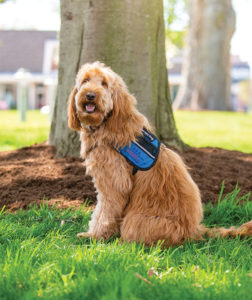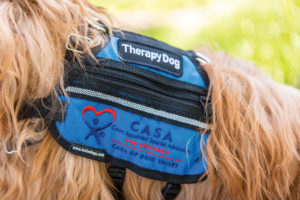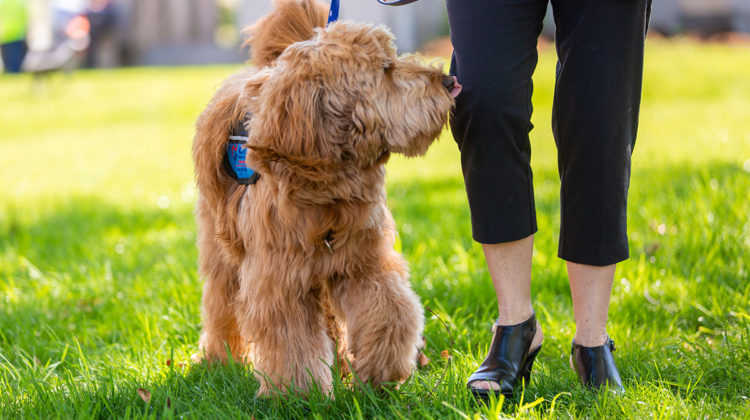Meet Watson, CASA’s emotional support dog
What child doesn’t love cuddling a stuffed animal when they are feeling lonely or afraid? But what if that stuffed animal came to life and provided genuine affection and real cuddles at that child’s most stressful and emotional time? At CASA of Ohio Valley, Watson, the nonprofit’s emotional support and therapy dog, does just that.
About CASA
Founded in 1996, CASA (Court Appointed Special Advocates) of Ohio Valley is a nonprofit child advocacy program that focuses on serving the children and families of Daviess County by recruiting and equipping caring community members to become child advocate volunteers.
According to their website, CASA “exists to promote and protect the best interest of children who have been abused or neglected by providing trained, court-appointed, adult volunteers to advocate for their safe, permanent and loving homes where they can thrive.”
Choosing Watson
Rosemary Conder, executive director for CASA, is constantly in search of forward-thinking ideas and practices that can ease the family court process and best meet the needs of the children involved.
Two years ago, Joelina Merritt, former bookkeeper turned Goldendoodle breeder, began bringing in photos to the office of the puppies they were breeding at family-operated Brook and Bay Goldendoodles. Rosemary said this opened up a conversation about the disposition of these particular dogs, who tend to be docile and loving, as well as loyal and beneficial to those with allergies.
Joelina and her husband donated a puppy for a CASA fundraising event, which one of the board members was able to purchase. Again, this sparked conversation about how wonderful and loving this particular breed of dog was. However, it wasn’t just the breed itself that Rosemary was drawn to, when she first saw a photo of Watson, she knew that was the dog for CASA.
“I just had an immediate connection to him,” Rosemary said. “He just had the sweetest face. I said, ‘What if we got him and trained him to be a CASA therapy dog for kids in court?’ So, of course, my board was all on board for that.”
Rosemary said the team began doing research about therapy dogs and how they were used in courtrooms across the country. One particular story in Florida stood out to Rosemary, about a judge that had a therapy dog under the desk where children would testify so the dog could lay with the child for emotional security. She said a tremendous number of articles began to surface of children having emotional support and therapy dogs in the schools to reduce some of the stress and trauma they experience in schools.
“We just really felt like it was the right timing,” Rosemary said. “And Judge Gordon was very, very responsive to having a dog in her court.”
Watson at Work
Lovingly described as “a rug,” Rosemary said Watson’s primary job may be a comfort to the children in family court, but he also has a secondary effect on everyone involved in the courthouse process.

“It’s funny to walk into the courthouse and immediately get a response from the security officers checking you in, to the perpetrator sitting out in the hallway, to the attorneys and social workers just gravitating toward him and loving on him,” Rosemary said. “You can just see them kind of relaxing by touching him and petting him and talking to him. And then, of course, when he goes and plays with the kids or lays down by the kids, there is just something so calming about a calm dog. He’s just got such a sweet disposition.”
When he was about a year old, Rosemary began taking Watson to the waiting area of family courtroom. She said that small children, who had been waiting with their foster mom for hours, immediately got down on the floor with Watson and began to play with him, and the environment in the whole room changed.
“I really think it’s a real thing,” Rosemary said. “It’s not just for dog lovers. I just think that dogs have that unique connection to humans that has been going on for centuries.”
Rosemary said that there are always small children in the courtroom that she feels a heartache for, but the one situation that touched her the most involved a 14-year-old girl who had been in and out of foster care her entire life. She said that when she and Watson entered the family court waiting area, the young girl sat slumped down in a waiting room chair with her headphones on, disengaged from the world—until Rosemary offered for her to pet Watson.
“She was very jaded, very angry and very stand-offish because she’d had so many adults disappoint her,” Rosemary said, adding that the teenager soon caught a glimpse of Watson out of the corner of her eye.
“There was something in the way that he looked at her and she looked at him—there was just this connection of calmness between them,” Rosemary said. “She sat up, took her headphones out and got down on the floor with him and he just laid his head across her leg. She put her headphones back in and just laid her head back—so serene. I don’t know that it changed her day—but it changed mine.”
Watson at Home
Although Rosemary knew instinctively that Watson was the right dog for CASA and maintains the role of Watson’s handler at the office, she does not play the role of Watson’s parent or caregiver once he goes home for the day. While he may not live at home as part of Rosemary’s immediate family, caring for Watson has still become a family affair.
Rosemary’s sister Cindy and her husband, retired city and airport manager, Bob Whitmer, are Watson’s caregivers at home. Cindy and Watson share a birthday as well as a special connection.
“She has always just had this incredible emotional connection to him, and him to her—he loves her like nothing I’ve ever seen,” Rosemary said. “They are actually his caregivers—he lives with them and they take care of him and love him. So he is a pet to them and therapy for the kids in court.”
Rosemary’s son Troy Ratliff is the owner and operator of On the Go mobile pet grooming studio. So all of Watson’s grooming needs are provided free of charge as a donation to CASA.
Service vs. Emotional Support
Watson has been trained in both basic and advanced obedience commands, is PAL (Purebred Alternative Listing) certified, has passed the canine good citizen test and has met all of the criteria needed to serve as a therapy dog. However, there is not a certified instructor in the area to submit the final test. Rosemary said, the test is not required and is more “bragging rights” than anything.

When most people see Watson in his blue CASA vest, they assume he is working.
“It’s hard to take a walk with Watson because every 10 steps someone says, ‘Can I pet your dog?’” Rosemary said. “I love that everyone is so respectful, but there is a difference in a therapy dog, an emotional support dog and a service animal.”
She said a service animal that has a vest on is actually working for one person, so you are not supposed to interact or talk with them while they are working. That animal also has ADA (Americans with Disabilities Act) rights in public places such as airports, restaurants and stores—anywhere that person can go.
Rosemary said an emotional support dog or therapy dog does not have ADA rights and they are for any person.
“Watson is as much for you as he is for me,” Rosemary said. “They are service animals in a different respect. You could take them into a nursing home or hospital where they can go room to room and offer emotional support. Therapy animals are not protected by ADA rules, so if they go into an establishment, it is because they have permission to be there.”
She added that she feels very fortunate that so many Owensboro businesses welcome dogs, yet, as a rule of thumb, she does not take Watson to places that serve food just out of respect for the restaurant owner, unless they offer outdoor seating.
“It’s a very pet-friendly town, so we as pet owners have an obligation to be respectful,” Rosemary said.
Not only has Owensboro proved to be pet-friendly, the Goldendoodle breed has found its way into both the City and County school systems. Several therapy and emotional support dogs in the area and in the schools, aside from Watson, have come from Brook and Bay Goldendoodles, and Joelina thinks that is the way it was meant to be.
“He’s [Watson] just a great dog,” Joelina said. “He was just meant for CASA and Rosemary. It worked out just perfect. Dogs are just good therapy all the way around. I call them therapy on four legs.”

